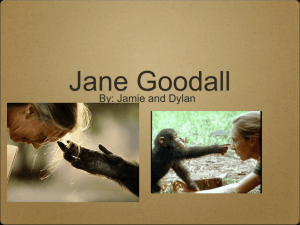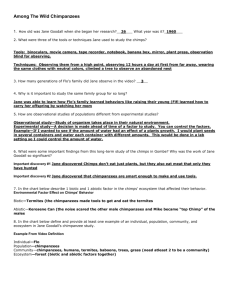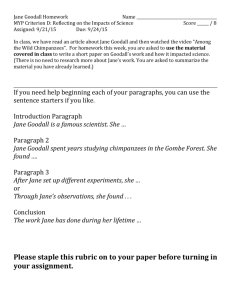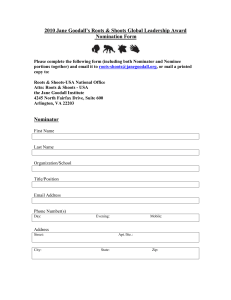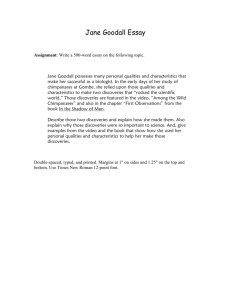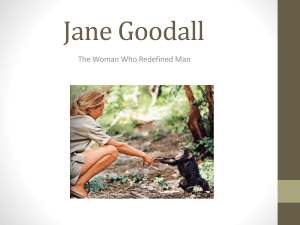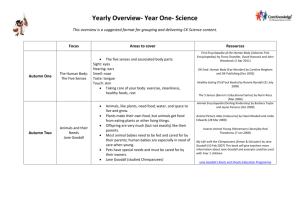Jane Goodall
advertisement
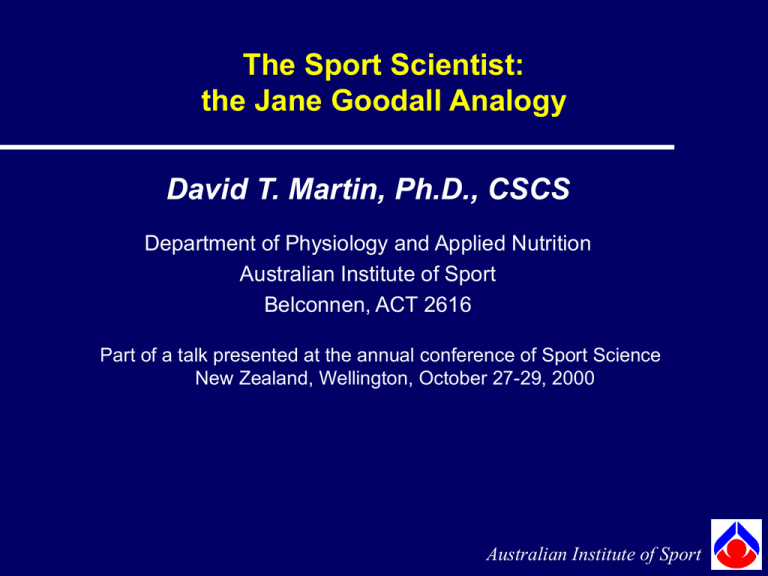
The Sport Scientist: the Jane Goodall Analogy David T. Martin, Ph.D., CSCS Department of Physiology and Applied Nutrition Australian Institute of Sport Belconnen, ACT 2616 Part of a talk presented at the annual conference of Sport Science New Zealand, Wellington, October 27-29, 2000 Australian Institute of Sport Jane Goodall – Early Interest, Genuine Desire Jane Goodall, grew up determined to share a forest home with African animals. She did not set out to become a famous naturalist. She ended up changing forever our understanding of chimpanzees. Australian Institute of Sport Jane Goodall Good Education, Encouraged by Experienced Mentor Jane won a job assisting Leakey with his studies, doing everything from documenting monkey behavior to hunting for fossils. Leakey eventually encouraged Goodall to study chimpanzees, animals that he believed could provide us a window into our own beginnings. Australian Institute of Sport Jane Goodall – Altruistic Behavior, Not Money Centered “Chimpanzees suffer in captivity, as they are exploited in entertainment, dressed up as pets, dragged around as photographers’ props and imprisoned. The least I can do is speak out for the Chimpanzees. They can not speak for themselves.” -- Dr. Jane Goodall Australian Institute of Sport Jane Goodall Polite Persistence In the beginning, studying the chimpanzees of Gombe was not easy for Jane. The chimpanzees fled from her in fear, and it took many months for her to get close to them. On many days Jane observed the chimpanzees through binoculars from a peak overlooking the forest. Australian Institute of Sport Jane Goodall – Accepted By Chimpanzees Gradually the chimpanzees became accustomed to her presence. Jane Goodall Novel Techniques, Methods Not Always Accepted Within a few years Jane became intimately familiar with the Chimps’ lives and she spent her days trailing them through the forest and recording their habits. Some of Jane’s techniques were unorthodox and controversial: for instance, rather than assigning her chimps numbers, she gave them names like "Fifi" and "Passion." Australian Institute of Sport Jane Goodall Motivated, Innovative, Made Mistakes Jane set up at Gombe a bananaladen feeding station designed to lure the apes out into the open, where they could be more easily observed. Jane now regrets this practice, which altered the chimps' natural behavior. Australian Institute of Sport Jane Goodall Unique Observations, New Insights Soon after becoming accepted by a local troop, Goodall realized that what she was observing challenged virtually every conventional notion about chimpanzees. Jane’s work shattered two longstanding myths: the idea that only humans could make and use tools, and the belief that chimps were passive vegetarians. Australian Institute of Sport Jane Goodall Field Data Recognized as Valuable Goodall lived at Gombe almost fulltime until 1975, accumulating a wealth of long-term data still valued by today's researchers. Scientists agree that Goodall's practice of following individual chimps for decades has yielded an unprecedented wealth of information for current researchers. Australian Institute of Sport Jane Goodall Making a Big Difference Australian Institute of Sport What is Sport Science? Using the scientific process to guide the practice of sport with the ultimate aim of improving performance. Australian Institute of Sport Jane Goodall and the Sport Scientist Early genuine interest Formal academic training Established mentor Opportunity to work in the field Patient persistence (not productive early on) Accepted into the group Careful observations Made mistakes (altruistic behavior) Research not accepted by academics at first Influenced, but not limited by basic science Eventually knowledge makes positive impact Australian Institute of Sport

